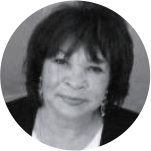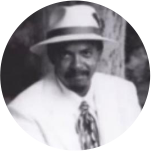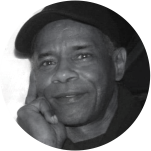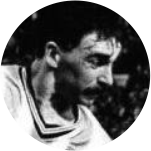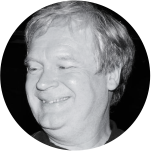
John Howard Anderson; Born 30thAugust 1949 and raised in the Pollok district of Glasgow to parents John (Snr) and Jeanie Anderson, one of two sons the other being Elliott. John never let his humble beginnings hold him back as he continued his education and, in later life, often commented that he was the only dustman (a short lived occupation) in Glasgow with A-levels. Following a brief period working for Collins the Publishers, John was to follow his dream (job) and true vocation as a Record Dealer. He later married Marisa (pronounced Mar-ee-sa) Anne Macdonald on the 10thof November 1973 who would become his rock and lifelong soulmate. Together they had a son, Stuart born in King’s Lynn during 1980.
Life and Legacy:
“It cannot be over-emphasised the importance of the achievements of this publicity shy, almost reclusive Scotsman. John wasn’t the only Soul collector or Soul dealer back in the late 60’s, but because of his obsession with obscure-label Soul, he went on to deal on a scale so unimaginable that there was no-one like him before, and can’t ever be again”
Growing up in 1960’s Glasgow, John was immersed in the cultural revolution of the period. He was, and always would be, heavily into music and fashion, specifically Soul, Ska and Mod music.
In his own words ““Glasgow wasn’t full of Soul people so you had to search around and find your own records. I went out every day, seven days a week. There was a small group of us who would go to pub, play records and enjoy them … I used to DJ 5 days a week, come home from work, go back out in Glasgow and DJ from 8 until 4 in the morning then back to work the next day.”
This obsession for Soul music led to a chance occurrence in a Glaswegian camera shop where he was shown into a room full of vinyl records hidden behind a false wall in the shops basement. He bought the lot, made a profit and as he said “I was on my way!”
By 1968 he was on his third record deal and had decided to go to the source of Soul music; The United States. He handpicked 60,000 soul 45’s and shipped them back to Glasgow; “when my mum and dad saw the truck turning up at our second floor council house they thought the floor would collapse with all the weight!”
By this time, he was also in a relationship with Marisa who would continue to be his partner, his rock and his soul mate for the rest of her life. In her own words; “I’ve been there from the word go – we used to go work, come home and I’d type up the lists at john’s mum and dad’s place, and post all the orders. His poor mum! Her house was full of records, in the hall, up the stairs, simply everywhere! I was also in the club’s kitchen cooking and washing up while John DJ’ed every night”
Together they formed Soul Bowl Records which would become a legendary institution for the provision of soul music throughout the world, and be integral to the emergence and continued existence of the Northern Soul scene. By John’s own admission they were “flying by the seat of their pants” although he “started this for the love of it” he also had to make it their living at a time where there were no parameters, no value, no record price guides … in a way they were 20 years ahead of their time. But John and Marisa didn’t just fly by the seat of their pants, they excelled and became trailblazers.
John quickly developed a knack for business and learned to seek out opportunities; such as calling up a young talented DJ named Colin Curtis and opening the conversation by saying “You don’t know me, but my name is John Anderson and I’ve got a few records you may be interested in.”
His ability to source and select records would continue for the next 50 years, helping and influencing such legendary DJ’s as Colin, Ian Clark, Andy Davies, Mark ‘Butch’ Dobson, Arthur Fenn, Steve Guarnori, Blair ‘Poke’ Hayden, Ian Levine, Richard Searling, Mick Smith, Soul Sam, and Snowboy, amongst many others (and not forgetting a whole raft of worldwide vinyl collectors who he also introduced to different genre’s of lost black American music. Many of whom are here today).
John and Marisa took Soul Bowl from Glasgow to King’s Lynn in Norfolk, England in the mid-70’s and established a haven for black music that would draw eager young music obsessive’s from all over the UK (and the world). They imported many millions of obscure soul, jazz, and funk records, and filled barns, garages, houses and warehouses with them. But more importantly they invited people into their home. They provided food, shelter and warmth. They made friends first, and business second. If you couldn’t pay straight away that was OK.
Integral to the Soul Bowl legacy was the now infamous mail order lists and the frantic Wednesday morning dash to the phone booth that many of you in this room will hopefully now remember with fond memories (Stuart would like to add an apology here to anyone he answered the phone to as a wee lad. He didn’t know at the time the grief he was causing and genuinely wanted you to know about his discovery of the new, and totally amazing, Transformers cartoon on TV).
John spent half his life on the road in America. As a 6’4” white man, with a heavy Glaswegian accent and at one time sporting an afro (one of several notable hairstyles I might add), he took himself deep into the ghettos and forgotten places of America time after time to fulfil his insatiable quest to find obscure records.
There isn’t a town or city that he hasn’t been too, and he generally got there first before anyone else. He left a trail of picked-out record stores, garages and basements in his wake, and left many fellow vinyl diggers dreading the question “Do you know John Anderson”?
Throughout his life on the road he lived the dream and to many he is simply the best there was or will ever be.
“I’ve been across America, I’ve been everywhere, done everything that a Soul guy could do, and I’ve lived it…I don’t think there’s anybody that’s been to the places I’ve been and seen the things I’ve seen in Soul music. Nobody, “That was my life.”
Stuart Anderson.










